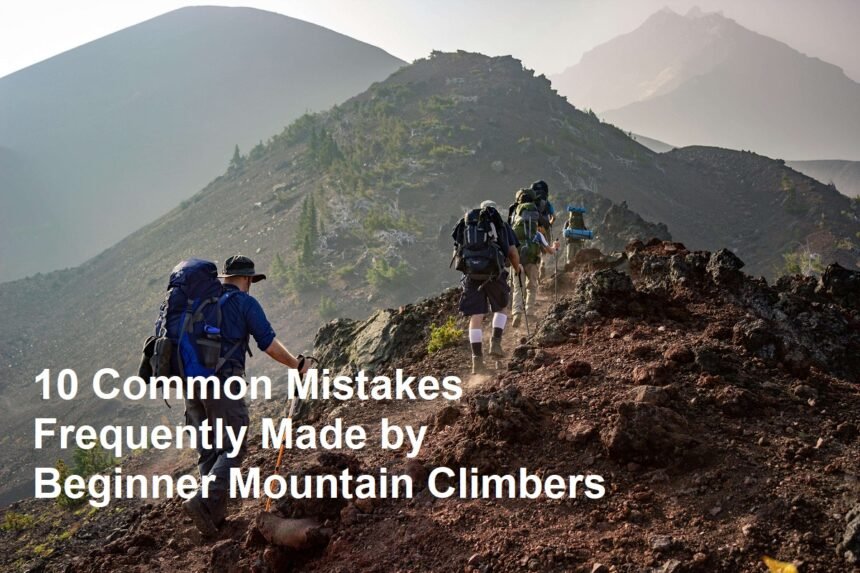Introduction
Embarking on mountain climbing is an exhilarating adventure that offers breathtaking views, a sense of achievement, and an incredible connection with nature. However, for beginners, the journey can be fraught with mistakes that may lead to safety hazards, discomfort, or even accidents. Understanding and avoiding these common errors is essential for ensuring a safe and enjoyable climbing experience. Here are the 10 most frequent mistakes made by beginner mountain climbers.
1. Inadequate Planning and Research
One of the most common mistakes is starting a climb without thorough preparation. Many beginners underestimate the difficulty of the terrain, weather conditions, or necessary gear. Proper planning involves researching the route, understanding potential hazards, checking weather forecasts, and knowing your physical limits. Without adequate preparation, climbers risk getting lost, facing unexpected dangers, or overexerting themselves.
2. Poor Physical Conditioning
Mountain climbing demands strength, stamina, and endurance. Beginners often jump into climbs without proper conditioning, which can lead to fatigue, dehydration, or injury. Engaging in regular cardiovascular workouts, strength training, and practicing climbing techniques beforehand can significantly improve performance and safety during the ascent.
3. Skipping Essential Gear and Equipment
Many novice climbers overlook the importance of high-quality gear. Essential equipment includes sturdy hiking boots, layered clothing, a helmet, gloves, a map or GPS device, and emergency supplies like first aid kits and food. Don’t compromise on safety gear; using poor or inadequate gear increases vulnerability to injuries or accidents.
4. Overestimating Personal Abilities
Confidence is great, but overconfidence can be dangerous. Beginners tend to underestimate the difficulty of the climb and overestimate their skills. It’s crucial to be honest about your experience level and choose routes suitable for beginners. Challenging oneself gradually helps build skills and confidence safely.
5. Ignoring Weather Conditions
Weather can change rapidly in the mountains. Many beginners ignore weather warnings or fail to check forecasts before starting the climb. Storms, heavy rain, high winds, or extreme cold can turn a pleasant hike into a dangerous situation. Always monitor weather reports and be prepared to postpone or turn back if conditions deteriorate.
6. Not Staying Hydrated and Nourished
Dehydration and lack of energy are common issues among beginner climbers. It’s vital to carry enough water and energy-rich snacks. Regular hydration and nutrition help sustain energy levels, prevent fatigue, and reduce the risk of altitude sickness. Remember, mountain climbing is physically demanding, so always listen to your body.
7. Climbing Alone
While some experienced climbers prefer solo ascents, beginners should avoid climbing alone, especially without proper training or experience. Having a partner or a guide enhances safety, provides emotional support, and helps in emergencies. Always inform someone trusted about your plans and estimated return time.
8. Disregarding Safety Rules
Many beginners neglect to follow safety guidelines, such as staying on marked trails, avoiding risky shortcuts, or ignoring signs of danger. Disregarding safety rules can lead to accidents or getting lost. Respect the environment and adhere to the advice of local guides or park authorities.
9. Lack of Proper Acclimatization
Altitude sickness is a real risk when climbing high mountains. Beginners often attempt to ascend quickly without allowing their bodies to acclimate to higher elevations. To avoid this, it’s advisable to take breaks, ascend gradually, and spend extra time at intermediate altitudes before pushing higher.
10. Underestimating the Importance of Rest
Fatigue theory is that climbers push themselves too hard without taking adequate rest, leading to exhaustion. Rest is critical for recovery, maintaining energy, and preventing injuries. Schedule regular breaks during the climb, and listen to your body’s signals. Pushing through fatigue can have serious consequences.
Final Thoughts
Mountain climbing offers incredible rewards, but it also involves risks—especially for beginners. By being well-prepared, respecting your abilities, and paying attention to safety, you can significantly improve your experience and reduce potential dangers. Remember, every experienced climber once started as a beginner, and learning from common mistakes is part of the journey toward becoming a confident and safe mountaineer.
Embark on your climbing adventures wisely, enjoy the breathtaking landscapes, and stay safe!












